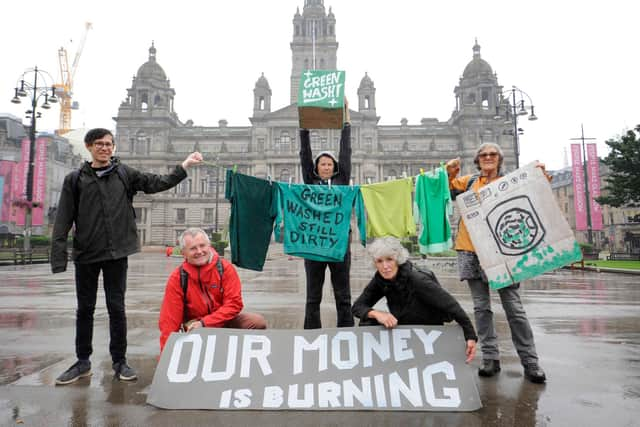'Banking on failure': Glasgow council under fire over fossil fuel pension investments ahead of COP26
The Strathclyde Pension Fund (SPF), which is run by Glasgow City Council, was asked to carry out an assessment of energy sector companies in its portfolios before the United Nations COP26 climate summit, taking place in November.
The report suggests fund managers would use a traffic light system where a ‘red’ grading, for firms that “cannot or will not adapt”, would see investment pulled.
Advertisement
Hide AdAdvertisement
Hide AdThe council’s own analysis suggests £316 million of SPF cash is invested in oil and gas firms.


However, estimates by campaign group Friends of the Earth Scotland suggest the total could be more than double that figure, at £836m.
Either way, the SPF – the largest of its kind in Scotland – has the biggest investment in climate polluters of any public fund in the country.
The SPF has reduced the percentage of its investments held in fossil fuel companies in the past few years and recently announced it would introduce divestment as a potential tool where firms did not address the climate emergency.
The council’s pensions committee is due to meet for the last time before COP26 on Wednesday, when the report on fossil fuel investments will be discussed.
Campaigners have branded continued financing of fossil fuels “financial folly and morally repugnant” while the world grapples with the task of curbing climate change.
Demonstrators staged a protest outside council offices in Glasgow to express anger at what they say amounts to “greenwashing”.
Ric Lander, divestment campaigner at Friends of the Earth Scotland, said: “Fund members, community activists and the city council have demanded the Strathclyde Pension Fund come up with a plan to divest from disastrous fossil fuel companies.
Advertisement
Hide AdAdvertisement
Hide Ad“Now it seems they’ve instead come up with a plan to carry on with business as usual.
“Continuing to invest hundreds of millions in climate polluters is financial folly and morally repugnant.”
He added: “Unless this policy is radically altered, Glasgow will host the world’s climate crisis talks knowing it’s pension fund is banking on their failure.
“City councillors do have the power to change course and invest sustainably.”
Isla Scott, from campaign group Divest Strathclyde, said: “We want to see SPF put in place a real policy that will ensure they divest from these climate-destroying companies and reinvest in a sustainable future.”
A spokesman for Strathclyde Pension Fund said: “It’s welcome that campaigners recognise that our direct investments in industries like oil and gas are already decreasing.
“They are also dwarfed by our investments in clean, renewable energy.
“The fund’s exposure to oil and gas is less than half of what it was just five years ago, in terms of a percentage of our passive equity – and closing in on a two-thirds reduction in terms of the overall value of the fund.
Advertisement
Hide AdAdvertisement
Hide Ad“Strathclyde Pension Fund is one of the first large pension funds to approve divestment as a tool to address firms that do not engage with the climate crisis.”
A message from the Editor:
Thank you for reading this article. We’re more reliant on your support than ever as the shift in consumer habits brought about by coronavirus impacts our advertisers.
If you haven’t already, please consider supporting our trusted, fact-checked journalism by taking out a digital subscription.
Comments
Want to join the conversation? Please or to comment on this article.
